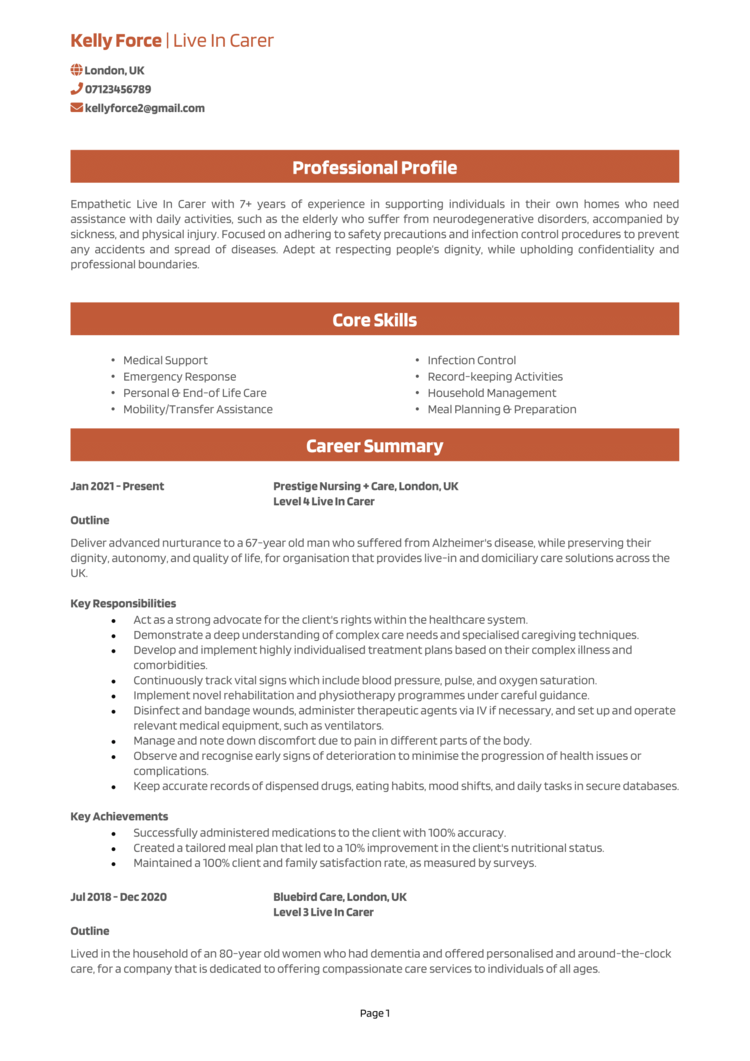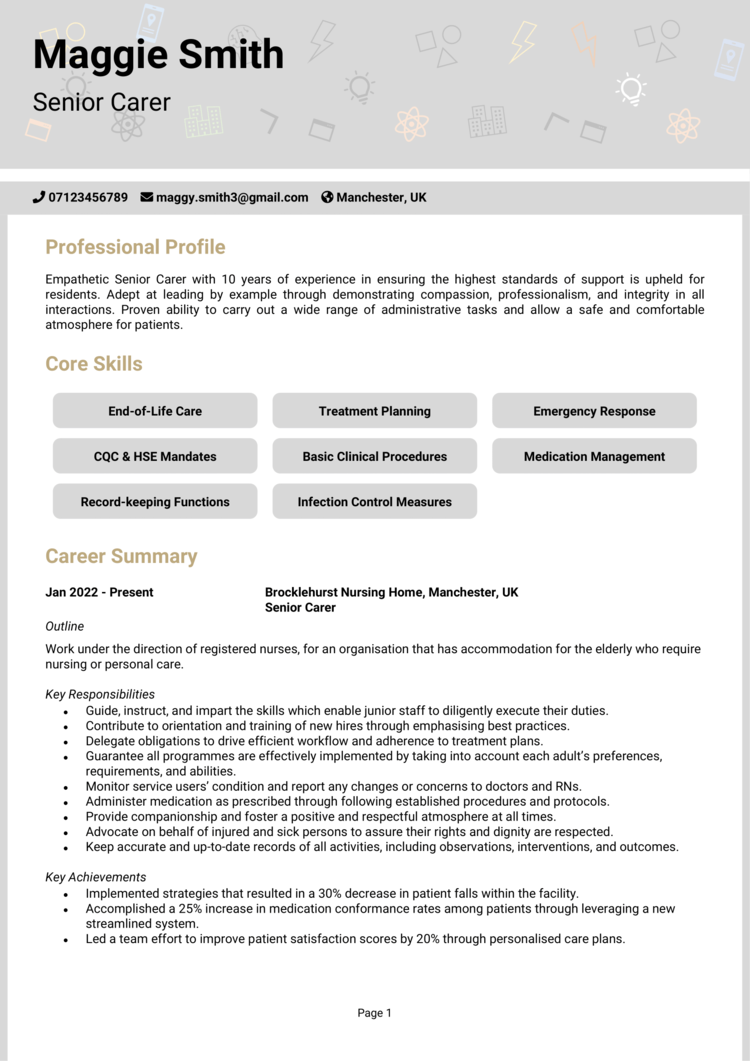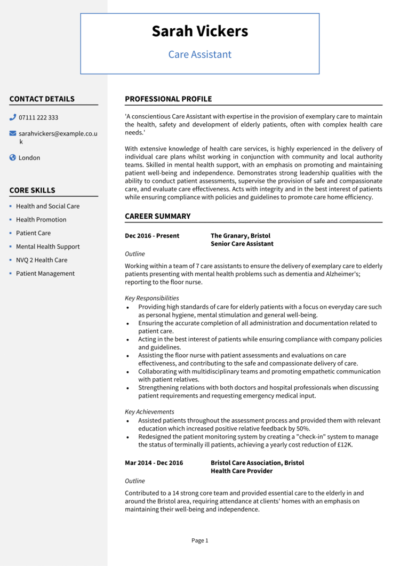Becoming a carer is a noble pursuit, and you’ll be able to bring comfort and dignity to those who need it the most.
Employers are looking for carers who are not only skilled in personal care but also have the emotional intelligence to provide support in a way that makes a real impact.
This guide and its Carer CV examples will walk you through crafting a CV that highlights your experience, empathy, and practical skills – helping you secure a role where you can truly make a difference.
Carer CV example

Live in Carer CV example

Senior Carer CV example

Foster Carer CV example

How to write your Carer CV
Learn how to create your own interview-winning Carer CV with this simple step-by-step guide.
To ensure your application stands out, this guide will cover how to write a CV effectively, showcase your most relevant skills, and present your experience in a way that proves you’re the perfect candidate. By the end, you’ll have a CV that highlights your ability to provide outstanding care while keeping things professional and polished.
Carer CV structure


Hiring managers are busy people, just like you. They need to quickly assess whether you have the skills and experience required for the role. A coherent structure will ensure that your strengths stand out at first glance, boosting your odds of a job offer.
Here’s how your CV should be laid out:
- Name and contact details – Clearly place your personal details at the top so employers can easily reach you.
- Profile – Immediately draw in recruiters with an introduction that highlights your experience, compassion, and commitment to providing quality care.
- Core skills – Highlight your strongest skills, such as personal care, companionship, and safeguarding.
- Work experience – Give a detailed look at your previous roles, focusing on how you supported clients and improved their quality of life.
- Education – Mention your degrees, certifications, and any training that supports your career path, particularly in health and social care.
- Additional info – Include any additional details, like hobbies or awards, that highlight your skills or personality.
Carer CV format


Presentation matters – especially in a profession built on attention to detail. A polished, well-organised CV format shows that you take pride in your work and understand the importance of clear communication.
Stick to these helpful tips for your formatting:
- Bullet points – These help recruiters skim through your accomplishments quickly and easily.
- Divide sections – Break your CV into distinct sections with clear headings for smooth navigation.
- Clear, professional font – Use a simple, professional font and keep your layout uncluttered for maximum readability.
- No more than 2 pages – Aim for no more than two pages of length, ensuring each section is impactful.
Carer CV profile


Your CV profile is your chance to introduce yourself as a dedicated and compassionate carer. This section should highlight your core strengths and experience while giving recruiters a sense of your approach to care.
Candidates who are newer to the hospitality field should consider a more comprehensive personal statement, complete with a personalised cover letter to help their application.
Carer CV profile examples
Profile 1
Compassionate Carer with three years of experience supporting elderly and disabled individuals in residential and home care settings. Skilled in assisting with personal care, administering medication under supervision, and providing emotional support. Proficient in mobility assistance, meal preparation, and maintaining a safe, comfortable environment. Dedicated to promoting independence and dignity for those in care.
Profile 2
Reliable and patient-focused Carer with two years of experience working in domiciliary care, assisting clients with daily activities and companionship. Adept at handling personal hygiene tasks, light housekeeping, and medication reminders. Skilled in using hoists and mobility aids to ensure safe movement. Passionate about improving quality of life through empathetic and personalised care.
Profile 3
Experienced Carer with over five years of expertise in supporting individuals with complex needs, including dementia and palliative care. Skilled in monitoring vital signs, liaising with healthcare professionals, and creating tailored care plans. Proficient in record-keeping, safeguarding, and emotional support. Committed to delivering high-quality, person-centred care.
What to include in your Carer CV profile
To make an impact, include:
- Your care experience – Whether you’ve worked in domiciliary care, residential homes, or hospitals, mention it here.
- Your core strengths – Highlight key abilities like personal care, emotional support, and companionship.
- Understanding of patient needs – Show that you can provide tailored care that improves well-being.
- Commitment to safeguarding – Employers want to know that you take safety and dignity seriously.
- Additional training – If you have first aid, dementia care, or manual handling qualifications, mention them.
Writing an effective core skills section


A core skills section gives hiring managers a quick snapshot of what you bring to the role. Since care work requires both practical and interpersonal skills, this section should reflect both.
Tailor your CV skills to the specific job you’re applying for. If the role is focused on elderly care, highlight experience with mobility support and dementia care. If it’s a live-in position, mention adaptability and household management.
Key skills for a Carer CV
- Personal Care Assistance – Supporting individuals with daily tasks such as bathing, dressing, and grooming.
- Medication Administration – Ensuring clients take prescribed medications correctly, following care plans and safety protocols.
- Mobility Support – Assisting clients with walking, transfers, and the use of mobility aids.
- Meal Preparation and Feeding – Preparing nutritious meals and assisting with feeding for those who require help.
- Emotional Support and Companionship – Providing social interaction and emotional reassurance to enhance well-being.
- Vital Signs Monitoring – Checking and recording basic health indicators like blood pressure, temperature, and pulse.
- Household Assistance – Performing light cleaning, laundry, and shopping to maintain a comfortable living environment.
- Safeguarding and Well-Being – Identifying and reporting concerns about a client’s physical or mental health.
- Dementia and Alzheimer’s Care – Understanding and managing the needs of individuals with cognitive impairments.
- End-of-Life and Palliative Care – Providing compassionate support for individuals in the final stages of life.
Outlining your work experience


Your work experience is the backbone of your CV – it’s what shows employers that you can handle the realities of care work, not just talk about it. While listing skills is useful, recruiters are much more interested in seeing how you’ve applied them in real-life situations.
If you don’t have much formal experience, don’t worry. Care is about more than just job titles – perhaps you supported an elderly relative, volunteered in a care home, or developed valuable people skills through a different role.
Even school projects or university placements in a healthcare setting can show your ability to provide support, follow procedures, and communicate with empathy.
How to make your past experience easy to read for employers

- Overview – Introduce the care setting, your role, and the type of support you provided.
- Key Responsibilities – Describe your core tasks, such as assisting with personal care, administering medication, or providing companionship. Use action words like “assisted”, “supported”, and “encouraged”.
- Key Achievements – Highlight how you made a difference, whether through improving a client’s daily routine, implementing a new care technique, or receiving positive feedback from families.
Example jobs for Carer
Carer | WillowBrook Care Home
Outline
Provided essential care and companionship to elderly residents in a retirement home, ensuring comfort, dignity, and a high standard of living.
Responsibilities
- Assisted residents with personal care, including bathing, dressing, and toileting.
- Monitored residents’ health, reporting any changes to senior staff.
- Helped residents with mobility, using hoists and walking aids safely.
- Engaged residents in social activities to improve mental well-being.
- Maintained accurate care records and followed safeguarding procedures.
Achievements
- Improved resident engagement by organising weekly social activities.
- Recognised for delivering exceptional care and forming meaningful connections with residents.
- Helped reduce incidents of falls by implementing better mobility support strategies.
Care Assistant | Helping Hands
Outline
Provided home-based care and assistance to elderly and disabled clients, supporting their independence and well-being.
Responsibilities
- Helped clients with daily tasks, including dressing, cooking, and light housekeeping.
- Administered medication reminders and ensured clients followed prescribed routines.
- Provided companionship and emotional support to combat loneliness.
- Assisted with mobility, ensuring clients moved safely around their homes.
- Kept detailed records of care provided and reported any concerns to supervisors.
Achievements
- Reduced hospital readmissions by ensuring medication compliance and proper nutrition.
- Received positive feedback from families for dedication and compassionate care.
- Helped improve client mobility through tailored exercise routines.
Support Worker | Habour Care
Outline
Supported individuals with disabilities in achieving greater independence through tailored care and assistance in a specialised care home.
Responsibilities
- Assisted clients with personal care, meal preparation, and daily activities.
- Helped clients access community services and participate in social activities.
- Provided emotional support and companionship, building positive relationships.
- Supported individuals with learning disabilities in developing life skills.
- Ensured all care was delivered in line with individual support plans.
Achievements
- Helped a client regain confidence in social situations through structured activities.
- Recognised by supervisors for maintaining excellent client relationships.
- Reduced anxiety levels in clients by implementing personalised calming strategies.
Education section


While experience is often the most important factor in care work, relevant qualifications and a strong foundational education can give you an edge. If you’ve completed health and social care training, first aid courses, or safeguarding certifications, make sure they stand out.
If you’ve got less experience, then rather than simply listing your qualifications, briefly mention how they’ve helped you develop your skills and understanding of patient care.
The best qualifications to boost a Carer CV
- Level 2 or Level 3 Diploma in Health and Social Care – A valuable qualification for professional carers.
- Care Certificate – Essential training for those new to care roles.
- First Aid and CPR Certification – Demonstrates your ability to respond to medical emergencies.
- Manual Handling Training – Important for assisting clients safely and preventing injuries.
- Dementia Care Training – Highly beneficial for those working with elderly patients or individuals with cognitive conditions.





